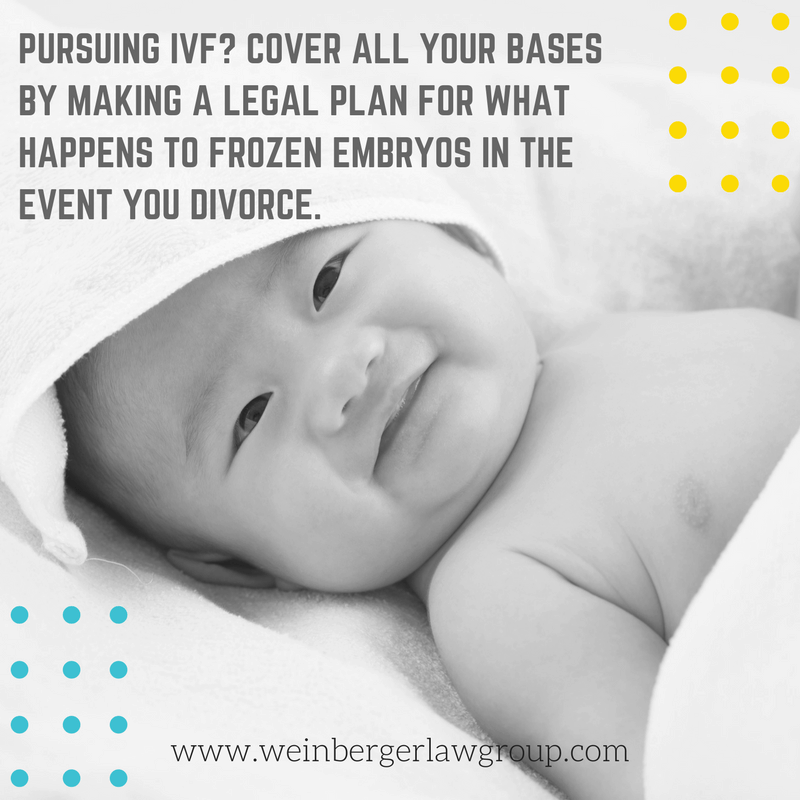Divorce Issues: What Happens To Frozen Embryos?

You and your partner planned to have children sometime in the future and to safeguard your timing, you worked with a fertility clinic to create a number of frozen embryos. But now the relationship is over and both of you are wondering, what happens to these embryos? Here is some guidance on what the courts in New Jersey say about who gets “custody” of frozen embryos.
As a way to illustrate the problems that can crop up around this issue, you may recall the bitter dispute that actress Sofia Vergara had with her ex-fiancé Nick Loeb over custody of the couple’s frozen embryos. Vergara wanted to destroy the embryos while Loeb had intentions of using a surrogate mother to carry the embryos to full term. He even volunteered to solely care for the anticipated child or children, to support them on his own, with no participation from Vergara. The battle wages on, with Loeb most recently claiming that his First Amendment Rights are being violated by Vergara’s most recent lawsuit against him. In the end, because the couple had no written agreement, according to the law in California, the matter will be left up to the discretion of the judge.
What about here in New Jersey? Before you and your partner decide on visiting a fertility clinic, take the case of JB v. MB, a New Jersey Supreme Court case decided back in 2001. In that case, a couple, who had had problems conceiving on their own, entered into a contract with the IVF clinic. That contract stated that J.B., the wife, and M.B. the husband agreed that all control and ownership of any embryos would be given over to the IVF program in the event that there was a divorce or unless the divorce judge orders who would take possession of the embryos.
The parties did split up and they did get divorced, but their final judgment of divorce did not mention the embryos. M.B. wanted control of the tissue and claimed that his right to procreation and the care and companionship of his children were being violated. M.B. argued that the contract with the IVF clinic was itself invalid because directing parents what to do with their potential pre-embryos was against public policy.
Ultimately, the court sided with M.B. finding that IVF agreements like these do, indeed violate public policy. The court felt that while IVF is becoming more and more commonplace, there really is no need for agreements such as these between the parties and the clinics that perform the IVF procedures. The court went on to state that they believed the better rule is to enforce agreements entered into at the time IVF is begun, but that are subject to the right of either party to change their minds about what to do with the pre-embryos up to the point that they are implanted or destroyed.
Interestingly, the court found that if there is a disagreement about what to do with the frozen embryos down the line, the interests of both parties will need to be evaluated. However, the court stated that ordinarily, the party choosing not to become a biological parent and utilize the tissue will prevail.
Obviously, frozen embryos cannot be forcibly implanted into one of the participants without consent at the time of implantation. But, would this apply to a surrogate as Nick Loeb is suggesting be done with his and Sofia Vergara’s embryos? If this was permitted by the court, who would have parental rights and responsibilities to the children if they are ultimately born? Would the parent who was against the implantation in the first place be liable for child support?
What do you think? Should one party have rights to frozen embryos over another? Should IVF contracts be permitted?
If you are making decisions about fertility and taking steps such as freezing embryos, we’re here to help you with any related legal issues, and to answer your questions. Please contact us today for an initial attorney consultation. Call: 888-888-0919.
Read More: Assisted Reproduction And Parental Rights




